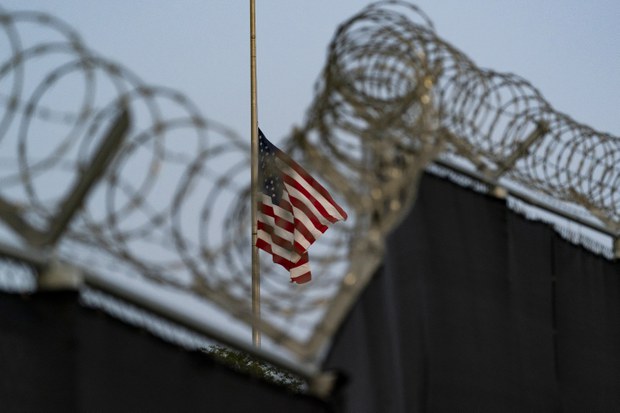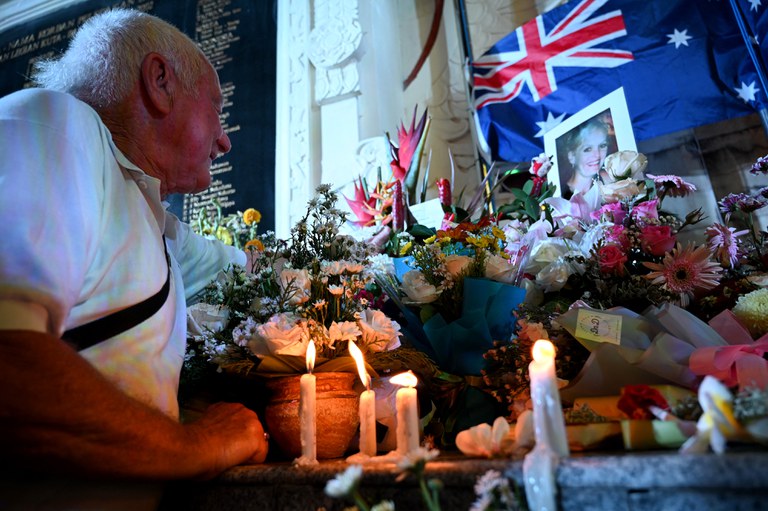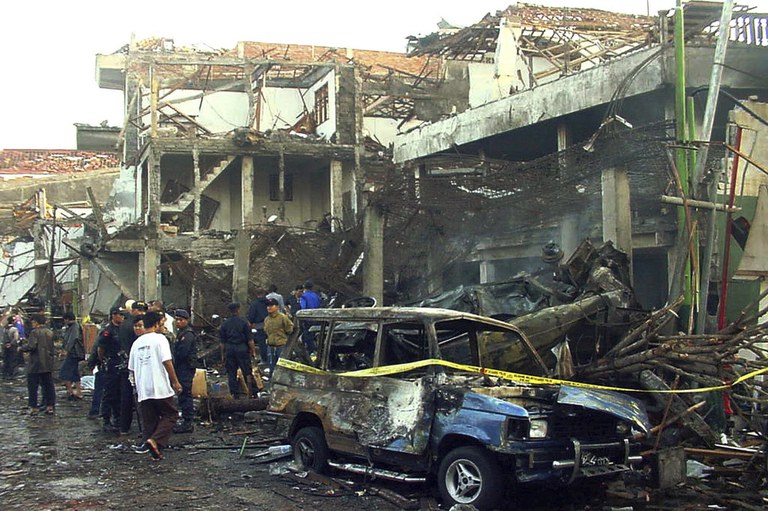Families of Bali bomb victims tell Guantanamo court of their enduring pain
2024.01.24
Guantanamo Bay, Cuba
 In this photo reviewed by U.S. military officials, the control tower of the Camp VI detention facility is seen at Naval Station Guantanamo Bay, Cuba, April 17, 2019.
In this photo reviewed by U.S. military officials, the control tower of the Camp VI detention facility is seen at Naval Station Guantanamo Bay, Cuba, April 17, 2019.
Two decades after their loved ones were killed in the 2002 Bali bombings, victims’ relatives who testified during a sentencing hearing here on Wednesday for two Malaysian defendants described how their pain had not changed.
Reading her victim’s statement against defendants Mohammed bin Amin and Mohammed bin Lep – who have both pleaded guility to murder in that attack – Susanna Miller of Britain recounted how she had traveled to Bali after her brother, Dan, 31, was reported missing.
She hoped he had somehow survived.
“There would be no miracle,” she testified, adding that her brother’s corpse was identified through DNA.
“These were real humans who have suffered … agonizing deaths,” Miller told the military court at the U.S. Navy base in Cuba.
Dan was among 202 people killed in twin bombings that destroyed a nightclub and a bar in Bali on the night of Oct. 12, 2002. Indonesia’s deadliest-ever terror attack was blamed on the Southeast Asian affiliate of al-Qaeda.
Dan’s wife of five weeks, Polly, did survive but suffered burns over nearly half of her body. Polly has suffered and undergone surgeries, Miller said. The family has raised 3 million pounds for adult burn victims.
Miller said her sister-in-law wrote her own victim’s impact statement but was not able to travel to Cuba to address the court.
“It will stay with me forever,” Miller said. “It should never have happened.”
“I spoke at Dan’s wedding, his funeral and now here,” she told the court.
Earlier in the day, a Florida couple, Frank Heffernan and Bonnie Hall, told the court about Heffernan’s daughter, Megan, who was 28 when she died in Bali.
“Megan was about as close to a free spirit as any child of God could be,” Heffernan testified.
“Megan’s loss will be with us forever,” he said, adding he tought about and prayed for her every day.
Heffernan said Megan’s brother and sister both have tattoos of her.
“The world is less bright without Megan,” he said.
“They must live with this profound shame.”
Heffernan’s wife of 20 years, Bonnie Hall, referred to Megan as her step-daughter.
Hall spoke about Megan’s mother, Sandra, who had been married to Heffernan for 25 years.
She said Sandy was attending a conference away from her home in Anchorage, Alaska.
“How hopeless she had to feel,” Hall said, noting that Sandy was alone in a hotel room and had to fly home alone after receiving the news.

The first witness to testify on Wednesday was Matthew Arnold of Birmingham, England, whose brother, Timothy, 43, was killed in the bombings.
Arnold said his brother lived in Singapore with his fiancé, a Thai national, who had to return to Bangkok following his death. The fiancé was pregnant but ended up losing the baby.
Arnold said Timothy’s death particularly hurt his father, who died in 2010.
“It was as if the life drained out of him at that moment,” Arnold said. “He never recovered from his loss.”
Arnold said he had been involved with other families to see justice, adding that those efforts were time consuming and expensive.
“This torment continues to this day,” he said.
While the whole court was visible in a room that was glassed off to reporters covering the hearing, TV screens showed the closed-circuit broadcast proceedings on a 40-second delay for security concerns. Military officials also prohibited photography in the courtroom.
The hearing is to resume on Thursday as the two defendants will have the opportunity to address the court. In addition, bin Amin’s brothers, Faizal and Fadil bin Amin, arrived in Cuba on Tuesday and could speak on behalf of their sibling.
As recently as Jan. 18, prosecutors said there had been complications with getting visas for the two men and that they might not be able to travel to Guantanamo Bay. Defense attorney Christine Funk expressed frustration, noting her team had spent months working on getting the proper clearance.
A little more than a week ago, bin Amin and bin Lep both pleaded guilty to murder, conspiracy and three other charges tied to the 2002 Bali bombings. After accepting the plea, Judge Wesley Braun, a U.S. Air Force officer, recommended they serve 20 to 25 years in prison and be repatriated to a third country.
The panel of five military officers, which is similar to a jury in a civilian court, will not be required to agree to the judge’s recommendation. They will begin deliberating after hearing all of the statements and closing arguments.

Bin Lep and bin Amin were arrested in Thailand in 2003 and then sent to CIA black sites at unknown locations before being transferred to Guantanamo in 2006 where they have since been incarcerated. The prison here opened in 2002, as part of the U.S. War on Terror in the wake of the Sept. 11, 2001, terrorist attacks on New York and Washington.
The two men were brought to the U.S. Navy base at Guantanamo in the same year as Encep Nurjaman, an Indonesian national also known as Hambali, who had also been sent to black sites after his arrest in Thailand in 2003.
He is suspected to have been the main planner of the Bali bombings. The three Southeast Asians originally were to be tried together at Guantanamo but Hambali’s case was separated from the Malaysians’ case in 2023.
Charging documents filed against tbe Malaysians and Nurjaman state that at the end of 2001, “including the periods before, during, and after the October 12, 2002, Bali bombings,” bin Lep and bin Amin helped Nurjaman “transfer money for operations, and obtain and store items such as fraudulent identification documents, weapons and instructions on how to make bombs.”
Those documents state that a suicide bomber walked into Paddy’s Bar in Bali on Oct. 12, 2002, and detonated a vest while a second suicide bomber drove an “explosives-laden” van to a location near the Sari Club before detonating the bomb.







